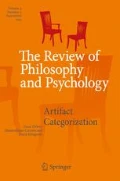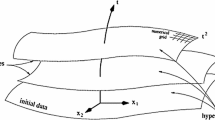Abstract
This article is concerned with the alleged incompatibility between presentism and specious present theories of temporal experience. According to presentism, the present time is instantaneous (or, near-instantaneous), while according to specious present theories, the specious present is temporally extended—therefore, it seems that there is no room in reality for the whole of a specious present, if presentism is true. It seems then that one of the two claims—presentism or the specious present theory—has to go. I shall argue that this kind of worries is mislead. Once we understand properly how our phenomenal experience as of passage and as of change, such as it is understood by specious present theorists, comes into being, the apparent phenomenologico-metaphysical conflict will disappear. In short, the mistake here is to presuppose that there is a link between phenomenology and metaphysics stronger than it actually is. Presentism is a metaphysical theory about what exists. Specious presentism is a phenomenological theory about how things appear to us in experience. As we will see, the two claims are not in conflict, and are in fact entirely orthogonal.
Similar content being viewed by others
Notes
It seems required for the presentist to take the present time to be instantaneous, since otherwise the present would be temporally big enough to include successive events. But then, these successive events would all be present, and thus would all be simultaneous—which leads either to a contradiction, or to a completely confused notion of simultaneity. (Besides, even if the present were said to be of a short non-zero duration—like a ‘chronon’, a quantum of time, a discrete and indivisible “unit” of time of non-zero length—its length would still be much shorter than the length of a specious present, so our worry would arise here as well.)
For good statements and defenses of presentism in general see for instance Merricks (1994, 1999) and Zimmerman (1998).
The way I suggest extensionalists should go, namely the claim that extensionalism is a purely phenomenological thesis (about phenomenal temporal parts) and not a metaphysical thesis (about metaphysical temporal parts), might be seen as a way for the extensionalist to be closer to retentionalism than what we might have thought. What I argued for in this article is that this is a way the extensionalist should go, otherwise all sorts of objections, like The Worry and the two objections from section 6, would indeed seriously arise against extensionalism. What these objections show, however, is not that extensionalism is false; rather, they show that a certain understanding of extensionalism—namely the claim that extensionalism is partly a metaphysical claim—is wrong. One should understand extensionalism as being a purely phenomenological claim, and this is one of the main claims of my article. Furthermore, ‘being closer’ to retentionalism is not a bad thing for extensionalism. After all, both views are of the same kind: they are both Specious Present theories, so it is no surprise that they are close to each other—they are more like quarrelling brothers than like enemies at war. Important differences still remain: extensionalism appeals to a notion of phenomenal temporal parthood, while retentionalism does not. As a consequence, the way the two views analyze the structure of the specious present is different. Both views owe us here an explanation: in the extensionalist’s case it is an explanation of what phenomenal temporal parthood and ‘phenomenal togetherness’ are, while in the retentionalist’s case there is a need for an explanation of the nature of retentions.
I am very grateful to Barry Dainton, Thomas Jacobi, Baptiste Le Bihan, L.A. Paul, and Gianfranco Soldati for discussions, comments, and objections that significantly helped me to improve this paper.
References
Broad, C.D. 1923. Scientific thought. New York: Harcourt, Brace and Co.
Dainton, B. 2000. Stream of consciousness. London: Routledge.
Dainton, B. 2003. Time in experience: reply to Gallagher. Psyche 9(10).
Dainton, B. 2008. Sensing change. Philosophical Issues 18, Interdisciplinary Core Philosophy.
Dainton, B. 2010. Temporal consciousness. In Stanford encyclopaedia of philosophy, online.
Dainton, B. manuscript. The Phenomenal Continuum. Accessible online at http://barrydainton.com/papers.
Foster, J. 1982. The case for idealism. London: Routledge and Kegan Paul.
Foster, J. 1992. The immaterial self. London: Routledge.
Hoerl, C. 2009. Time and tense in perceptual experience. Philosophers’ Imprint 9, n° 12.
Husserl, E. 1964. The phenomenology of internal time-consciousness. In ed. M. Heidegger (trans: Churchill, J.S.). Bloomington: Indiana University Press.
James, W. 1890. The principles of psychology. New York: H. Holt and company.
Kant, I. 1781. Critique of pure reason. (trans: Guyer, Paul, and Allen Wood), Cambridge: Cambridge University Press, 1998. Originally published in 1781/1787.
Kelly, S. 2005. The puzzle of temporal experience. In Cognition and the brain: The philosophy and neuroscience movement, ed. Andrew Brook. Cambridge: Cambridge University Press.
Merricks, T. 1994. Endurance and indiscernibility. The Journal of Philosophy 91: 165–184.
Merricks, T. 1995. On the incompatibility of enduring and perduring entities. Mind 104: 523–531.
Merricks, T. 1999. Persistence, parts and presentism. Noûs 33: 421–438.
Paul, L.A. 2010. Temporal experience. Journal of Philosophy 107(7): 333–359.
Phillips, I. 2011. Indiscriminability and experience of change. The Philosophical Quarterly 61: 808–827.
Sider, T. 2001. Four-dimensionalism. Oxford: Oxford University Press.
Varzi, A. 2003. Naming the stages. Dialectica 57: 387–412.
Zimmerman, D. 1998. Temporary intrinsics and presentism. In Metaphysics: The big questions, ed. Van Inwagen and Zimmerman. Malden: Blackwell.
Author information
Authors and Affiliations
Corresponding author
Rights and permissions
About this article
Cite this article
Benovsky, J. The Present vs. the Specious Present. Rev.Phil.Psych. 4, 193–203 (2013). https://doi.org/10.1007/s13164-012-0120-5
Published:
Issue Date:
DOI: https://doi.org/10.1007/s13164-012-0120-5



